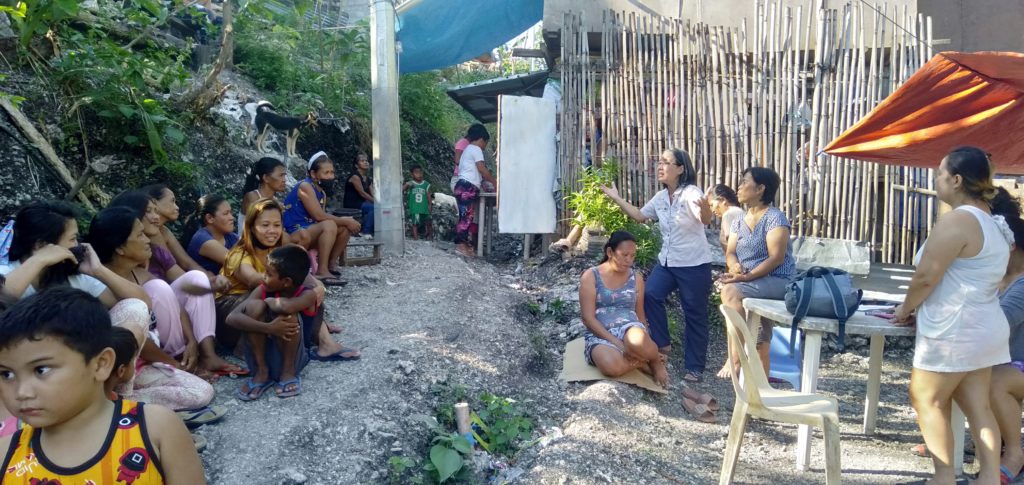A training on primary health care was conducted for the staff of the Committee of German Doctors for Developing Countries based in Cebu last June 22 – 24, 2016 in line with the project, “Building community-based health programs to promote health and prevent disease in urban poor communities in Cebu.”
The training was participated by six members of the staff, visiting German doctor Dr. Hartwig Schroettke, Philippines Managing Director Dietmar Schug, and Dr. Thomas Koenig, Chief Medical Officer for Mindanao and Cebu. It was held in the Institute of Religion and Culture in Guadalupe, Cebu City.
The first day started with introduction of the participants, followed by sharing of how we perceive are current medical, social, economic, and political causes of the people’s ill health. The video “Story of Rosario” and a documentary film, “Philippine agenda – health” were the springboard for the exchange of ideas which were then synthesized by VPHCS physician Dr. Erlinda Posadas with an overview of the Philippine health care system, stressing on the need for primary health care to address the basic health needs of the people.
This was followed by the talk of Dr. Lilia Hernandez. She is a pioneer of CBHP in the 1970s before she went to the U.S. during the Martial Law period, where she has lived for several years until the present time but coming back to the Philippines often for the past 10 years to volunteer in VPHCS activities. Dr. Hernandez shared about the principles and concepts of CBHP, stressing that CBHPs train CHWs to motivate and support the people to remain healthy, how to care for people in simple illnesses, and recognize signs and symptoms when professional help is needed. CBHPs raise awareness, changing views and building skills.
On the second day, Dr. Koenig talked about child nutrition and malnutrition, and the causes of malnutrition in children in different levels and examples: the child himself (low birth weight, frequent infections), family (low socio-economic status), community level (inavailability of food, insufficient land), society level (unemployment), country level (natural disasters, depressed economy, corrupt government, poverty).
Dr. Koenig also stressed the need to teach mothers and fathers about nutrition and prevention of malnutrition. Then, he explained about primary health care which is embodied in the 1978 Declaration in Alma Ata although PHC was already practiced in 1960s as evidenced by the book “Where there is no doctor” by David Werner. Then, he shared about his Nepal experience from 1998 to 2001.
Dr. Koenig was followed by Dietmar Schug who started by giving a very good history about CGD which started in 1981 by Fr. Bernhard Ehlen in Somalia refugee camps with the principle that health is a human right and the vision that the poorest of the poor should attain health and maintain healthy lives. In the Philippines, CGD started in 1983 in Tondo Smoky Mountain where Dietmar Schug first started to work after arriving here. Other areas followed including Bagong Silang and Payatas dumpsite, Mindanao in 1985 and Oriental Mindoro. Dietmar Schug extensively discussed about the work of the CGD in Xavier University Community Health Care Center (CHCC), Bukidnon, Valencia, BUDA, partnership with XU College of Medicine in a primary health care project. He also discussed about the different activities over the years, stressing about the need for community participation to link rolling clinic health services and CHW health services.
Cebu project coordinator Rina Jacalan followed his talk, elaborating about the history of CGD in Cebu and the first three major dumpsites Inayawan, Bankal and Umapad as the first rolling clinics, then extending to Sawsawan, Cordova, Talisay and other areas until reaching the present 16 areas. She enumerated the different programs and services in the rolling clinics, including consultations, diagnostics, medicine dispensing, nutrition program, tuberculosis, health teachings, referrals to hospitals and dental missions.
On the third day, Dr. Posadas shared about the VPHCS experience of implementing PHC in urban and rural poor communities, stressing the eight elements of primary health care. This was then followed by a workshop on how VPHCS can work together with CGD and how primary health care can be incorporated in the rolling clinics including the 13 communities not covered by the project.
The training ended with a written self-evaluation where the participants said that they had new ideas on how to improve their services in the rolling clinics, like training volunteers, teaching patients about their health and letting them involve in the development of their own communities. There were hopes to have more seminars and for CGD to work hand in hand with VPHCS for the betterment of the rolling clinic communities.



